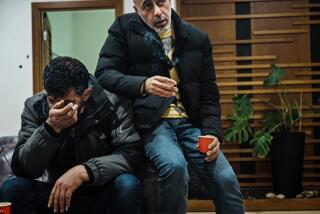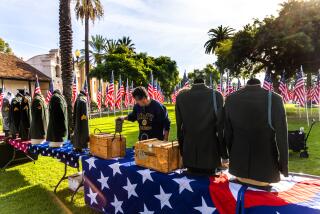Families of Guardsmen Sent to Iraq Bear Lonely Burden
- Share via
FREE SOIL, Mich. — When her husband, Sgt. Darin Schultz, left for Iraq with his Michigan National Guard unit, Tami Schultz got a prescient warning from her cousin about the emotional ups and downs that would lie ahead.
The cousin knew firsthand: Her husband is a Pennsylvania National Guard member who has already done a tour in Iraq.
“She said, ‘You’ll have good days and bad days, and some days you won’t even feel like getting out of bed and end up feeding the kids breakfast cereal for dinner,” said Schultz, sitting at a picnic table at the family’s 80-acre farm in this tiny community in northwest Michigan.
“She was right,” Schultz said with a sigh combined with a laugh.
It is the first overseas deployment for Darin Schultz and other members of Bravo Company, 1st Battalion, 126th Armor Regiment -- and the first overseas duty in Bravo Company’s 50-year history.
As the U.S. war in Iraq stretches into its third year, National Guard and Reserve units are bearing an increasing burden. Family members are scrambling to deal with anxiety and fear that few anticipated.
More than 100 Guard and Reserve members have been killed since May 1, marking the deadliest stretch of the war for the nation’s “citizen soldiers.”
President Bush is scheduled to discuss the war on terrorism with Air Force and National Guard personnel in Idaho Wednesday. Nearly 40% of U.S. troops in Iraq are from Guard or Reserve units, double the figure from 18 months ago.
Like many young men in this part of Michigan, Darin Schultz joined the National Guard soon after he graduated from high school. When they married five years later, Tami Schultz figured the most dangerous duty he would ever see would be a riot or a natural disaster in Michigan.
Now Schultz and other members of Bravo Company are in Baghdad guarding the U.S.-run Green Zone and providing protection for convoys that navigate streets where roadside bombs are known to be hidden.
The families of full-time, active-duty personnel have the advantage of highly developed family support groups, particularly at larger bases such as the Marine Corps’ Camp Pendleton or the Army’s Ft. Bliss.
Since Vietnam, the military has stressed “family readiness,” and now offers a range of financial, emotional and religious assistance to the spouses and children of deployed troops.
Some Reserve and Guard units are in tightknit small towns with long traditions of offering emotional support in times of need. But for other units, like Bravo Company, support systems aren’t readily available.
Guard members live in disconnected towns spread throughout the Farm and Forest Belt of western Michigan. Two-thirds of the Michigan Army National Guard units have either been to Iraq or are scheduled to go.
To help families cope, the Michigan National Guard has arranged pre-deployment seminars, morale help lines, a summer camp for children and marriage counseling.
But it is largely up to individual families to knit together their own defenses, Guard officials concede. “We’re doing what we can, but we’ve found that the person-to-person network -- support from family members and neighbors -- is the most effective,” said Michigan National Guard spokeswoman Maj. Dawn Dancer.
Tami Schultz, 31, has two strategies for coping: stay busy with the kids and with helping other Bravo Company spouses, and avoid television news about Iraq.
With her husband gone, she continues to run the family business, selling propane and propane appliances. She has thrown herself into Girl Scouts, 4-H Club, sports, horseback lessons and other activities for the couple’s children: Brandon, 4; Gunner, 6; and Stephanie, 7. Her mother, Joyce Ziehm, has come from Florida to be with her during the deployment.
“You learn to rely on family and friends,” Schultz said. “In the beginning, it was tough for all of us. The kids go through a defiant phase when Daddy’s gone. But we’re halfway home and I know we’re going to make it.”
Bravo Company’s armory is in Manistee, a town of 6,000 residents adjacent to Lake Michigan where life often revolves around church, high school athletics, fishing in the summer and hunting in the winter.
The unit draws its soldiers from small communities throughout the region: Ludington, Thompsonville, Lake City, Wellston, Irons, Walhalla and others.
Before being called to active duty, Bravo soldiers were college students or worked as police officers, truck drivers, construction workers and postal workers, among other jobs.
Darin Schultz’s parents, Nancy and David Schultz, live in nearby Onekama, and David works at the Indian casino outside Manistee. Nancy Schultz said her friends and her minister from the Church of the Brethren had helped her deal with the uncertainty and the worry.
She said she wished the Army could share more information about Bravo Company in Baghdad.
“It’s not like we want to know any secrets,” said Schultz, 58. “But it would be easier if we knew a little bit more.”
After three months’ training at Ft. Dix, N.J., Bravo Company left for a yearlong deployment to Iraq in March.
The Manistee News-Advocate, which had sent reporters to Ft. Dix, published a 16-page special section: “Manistee’s Legendary Bravo Company Standing Tall in Iraq.”
Amy Cross is keeping a day-by-day scrapbook for her husband, Staff Sgt. Chip Cross, a state corrections officer who was part of another Guard company but was transferred to Bravo Company to fill out its ranks.
The couple lives atop a hill in Bear Lake with their children, Jenna, 6, and Abby, 4.
Cross, 38, jokes that until the Iraq deployment, her husband and other Guard members thought of the Guard as “kind of a hobby” that entailed one weekend of drill each month at the armory and then two weeks each summer at Michigan’s Camp Grayling.
“Now that hobby has sent them halfway around the world,” she said.
Cross’ friend Nancy Green offers solace whenever needed.
“Whenever she’s scared, I come over,” said Green, 51.
Green’s ex-husband served in Vietnam and her son is an Air Force sergeant who survived the 1996 terrorist bombing of Khobar Towers in Saudi Arabia that killed 19 U.S. personnel and injured hundreds.
Cross’ scrapbook entries show the strain.
One entry reads, “The girls are demanding at times (as kids are). I’m just frustrated about everything. Very stressed this weekend.... I’m maxed out.”
A week later, the text of an e-mail sent to her husband said, “When your days are long, remember there are three special people who love you and think you are king.”
And days later, another entry reads, “Jenna was still upset and missing her Daddy. We cried some more and I held her for a long time. I told her I wish it didn’t have to be this way ... explaining that Army is Daddy’s work and that he has to do it.”
So far, Schultz and Cross’ company has suffered no casualties. But the daily news from Iraq about the mounting death toll has added to the turmoil of families who wait and hope for the best.
“It’s a roller-coaster ride,” Cross said. “I say that a lot. You just try to hang on.”
More to Read
Sign up for Essential California
The most important California stories and recommendations in your inbox every morning.
You may occasionally receive promotional content from the Los Angeles Times.













